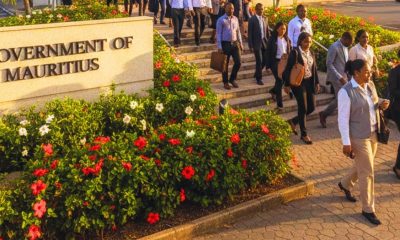News
Teacher Training Needs as Kreol Morisien is Set for HSC

Kreol Morisien (KM) may soon be introduced as a subsidiary subject in the Higher School Certificate (HSC) examinations, pending the fulfillment of certain criteria, including a sufficient number of students and qualified teachers. A survey is currently being conducted to assess interest levels and determine the next steps.
Meanwhile, the University of Mauritius has launched a Bachelor of Arts (Honours) in Creole Studies aimed at training teachers, which is a critical component for the project’s sustainability.
After initially stating that the conditions for the introduction of Kreol Morisien into the HSC were not met this year, Education Minister Mahend Gungapersad has since reversed his decision.
This change followed a working meeting with Dr. Arnaud Carpooran from the University of Mauritius and two representatives from the Catholic Education Service (SeDEC), Drs. Pascal Nadal and Jimmy Harmon.
The group decided that KM will be introduced as a subsidiary subject in Grade 12 this year, with plans for it to be offered as a main subject starting in 2026.
A survey is currently ongoing to establish the number of students interested in KM and, importantly, to identify available teachers for this new subject at the secondary level.
According to regulations from the Private Secondary Education Authority (PSEA), colleges must have a minimum of 12 students enrolled in a subject to offer it.
It remained to be seen whether this rule will apply to KM or if exceptions will be legislated by the authorities.
If the introduction of KM in the HSC goes ahead, it will complete a vital link in the educational chain.
The language has been available as an optional subject in primary schools since 2012 and made its entry into secondary schools in 2018.
The first cohort of KM students sat for the National Certificate of Education (NCE) exams in 2021, achieving an impressive pass rate of 96.6%.
In 2023, a small group of 188 students from this cohort took the inaugural National School Certificate (NSC) exam, yielding a pass rate of 96.28%.
The lower participation numbers can be attributed to the late decision to introduce KM in Grade 10, at a time when students had already chosen their subjects.
In 2024, participation rose to 535 students, who passed with a rate of 94.01%. A credit in KM will also be considered for promotion to Grade 12.
At the University of Mauritius, which is the awarding body for the National School Certificate and National Higher School Certificate exams, measures have been put in place to ensure the smooth introduction of KM into the HSC curriculum.
Dr. Carpooran pointed out that a key responsibility of the university in this process will be to ensure effective teacher training:
“The issue of human resources is crucial. That’s why we are launching the BA (Hons) Creole Studies this year,” he stated.
Previously, the university offered a combined BA (Hons) in French and Creole Studies.
Now, the two languages will have separate programs.
“By separating KM from French, we aim to make the course accessible to students who do not have a background in French.
Those who studied other subjects at HSC will thus be able to enroll in the BA (Hons) Creole Studies program,” Dr. Carpooran added.
More information about this new degree will be provided during the University of Mauritius Open Days scheduled for February 12, 13, and 14.
Prospective students can engage directly with course leaders to learn more.
Additionally, existing primary teachers of KM who possess a Teacher’s Diploma can pursue a “Top Up” at the Mauritius Institute of Education (MIE) to earn their Bachelor’s degree, making them eligible to teach in Lower Secondary.
Currently, Catholic and private colleges appear to have a sufficient number of KM teachers.
Following the new Minister’s decision to revise criteria for the PGCE, they will be able to hire degree holders.
However, state colleges are expected to face significant shortages due to different recruitment procedures that require passing through the Public Service Commission.
During discussions at the Ministry of Education, long-term planning was emphasized.
A special scholarship program for Kreol Morisien is anticipated, which could potentially triple or quadruple the number of students opting for KM in the HSC over the coming years.
To date, around twenty degree holders are currently pursuing their PGCE in Kreol Morisien at MIE, with some completing their training in June and others by the end of the year.
The MIE has also finalized the KM syllabus for HSC, which has already been validated by the relevant authorities, and textbooks are awaiting approval.
On paper, the conditions for the introduction of KM into the HSC are met, yet finalization concerning demand and available human resources remains pending.
Questions Surrounding Alternate Orthographies
Before the standardization of Kreol, various orthographies were utilized, including those by Dev Virahsawmy and Ledikasyon Pu Travayer, from which many books have been published.
Will these be permissible for literature classes in a KM program as a main subject?
There are differing opinions on this matter.
One perspective advocates for uniform transcription into standard Kreol for consistency, while another argues for retaining original versions from different periods, similarly to English literature.
This issue will need to be addressed before finalizing the curriculum.
Student Sit-In at John Kennedy College
Students at John Kennedy College organized a morning sit-in to demand the resignation of the principal.
The Ministry of Education sent officials to the site to help de-escalate tensions. Students reportedly criticized the principal’s management style.
The principal has since sought support from his union, and the situation returned to normal later in the day.
John Kennedy College is one of twelve academies with a diverse student population.
Source: Le Mauricien











